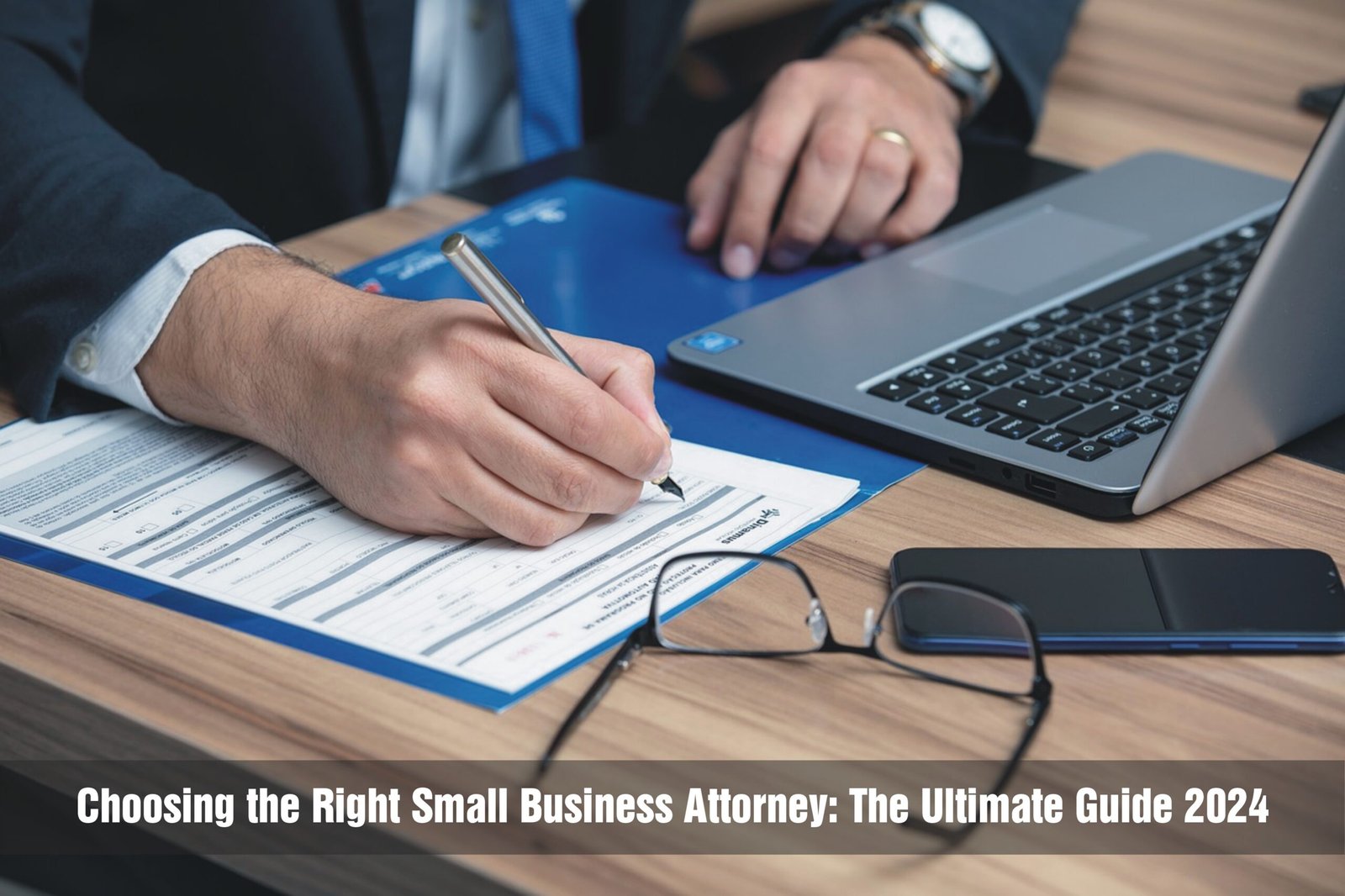Running a small business comes with many responsibilities, including managing legal matters. Whether you’re starting a new business or running an established one, having the right legal support is crucial. A small business attorney can provide the expertise needed to navigate complex legal landscapes, protect your interests, and help your business thrive. This ultimate guide will help you understand the importance of small business attorneys and how to choose the right one for your needs in 2024.
Table of Contents
Why You Need a Small Business Attorney

Legal Expertise and Guidance
A small business attorney is well-versed in business law and can offer valuable advice on various legal issues. From business formation to compliance, contracts, and intellectual property, their expertise ensures that your business operates within the law.
Risk Management
By identifying potential legal risks and providing strategies to mitigate them, small business attorneys help protect your business from lawsuits, fines, and other legal troubles. They ensure that your business practices are legally sound, reducing the likelihood of costly legal issues.
Efficient Dispute Resolution
Disputes are inevitable in business. A small business attorney can represent your interests in negotiations, mediation, and court proceedings. Their involvement can lead to quicker and more favorable resolutions, allowing you to focus on running your business.
How to Choose the Right Small Business Attorney

Assess Your Business Needs
Before you start looking for a small business attorney, it’s essential to understand your specific legal needs. Different attorneys specialize in various areas of business law, so identifying your requirements will help you find the right match. Consider the following aspects:
- Business Formation: Do you need help choosing the right legal structure for your business?
- Contracts: Do you require assistance with drafting, reviewing, or negotiating contracts?
- Employment Law: Are you looking for guidance on hiring practices, employee contracts, or workplace disputes?
- Intellectual Property: Do you need to protect your trademarks, copyrights, or patents?
- Compliance: Are you concerned about adhering to local, state, and federal regulations?
- Litigation: Do you need representation in legal disputes or lawsuits?
Research and Referrals
Start by asking for recommendations from other business owners, colleagues, or industry associations. Personal referrals can lead you to reputable small business attorneys who have proven their expertise. Additionally, research online directories and legal websites to find attorneys with high ratings and positive reviews.
Check Credentials and Experience
Ensure that the attorney you choose is licensed to practice in your state and has experience in handling legal matters relevant to your business. Look for attorneys who specialize in small business law and have a track record of success in similar cases. Consider their years of practice, areas of expertise, and any professional accolades or certifications.
Schedule Consultations
Once you have a shortlist of potential small business attorneys, schedule consultations to discuss your needs and evaluate their suitability. Ask them about their experience, case management strategy, and costs during these meetings. Pay attention to their communication style and whether they take the time to understand your business.
Questions to Ask a Small Business Attorney
To ensure that you choose the right small business attorney, ask the following questions during your consultation:
- What is your experience with small businesses like mine?
- Look for an attorney who has worked with businesses similar to yours in size and industry.
- What areas of business law do you specialize in?
- Ensure their expertise aligns with your specific legal needs.
- How do you charge for your services?
- Understand their fee structure, including hourly rates, flat fees, and any retainer requirements.
- Can you provide references from other small business clients?
- Speaking with other clients can give you insight into their reliability and effectiveness.
- How will you communicate with me and keep me informed?
- Effective communication is crucial for a successful attorney-client relationship.
- What is your approach to handling legal disputes?
- Understand their strategy for resolving conflicts and representing your interests.
- Will you be handling my case personally or will it be delegated to other attorneys or staff?
- Ensure you know who will be working on your legal matters.
Evaluating Your Options
After meeting with several small business attorneys, take the time to evaluate your options. Consider the following factors:
- Expertise and Experience: Choose an attorney with the right experience and knowledge in small business law.
- Compatibility: Select an attorney whose communication style and approach align with your preferences.
- Cost: Ensure their fees are reasonable and within your budget.
- References: Consider feedback from other clients to gauge their reliability and effectiveness.
Building a Relationship with Your Small Business Attorney

Once you’ve chosen the right small business attorney, it’s essential to build a strong working relationship. Here are some tips to ensure a successful partnership:
Be Transparent
Provide your attorney with all the necessary information about your business, including financial records, contracts, and any ongoing legal issues. Transparency allows them to offer accurate advice and develop effective strategies.
Communicate Regularly
Maintain open lines of communication with your attorney. Schedule regular check-ins to discuss ongoing legal matters, upcoming changes, and any concerns you may have. Promptly respond to their inquiries and provide the required documentation.
Follow Their Advice
Trust the expertise of your small business attorney and follow their recommendations. Their advice is based on their knowledge of the law and your business’s best interests. Ignoring their guidance can lead to legal problems and increased risks.
Plan for the Future
Work with your attorney to develop a long-term legal strategy for your business. This includes planning for growth, addressing potential legal challenges, and ensuring compliance with evolving regulations. A proactive approach can prevent issues and position your business for success.
Common Legal Issues Faced by Small Businesses

Small businesses encounter various legal challenges that require the expertise of a small business attorney. Here are some common issues and how an attorney can help:
Business Formation and Structure
The success of your firm depends on selecting the appropriate legal structure. A small business attorney can help you decide whether to form a sole proprietorship, partnership, LLC, or corporation. They will guide you through the registration process and ensure compliance with all legal requirements.
Contract Drafting and Review
Contracts are the foundation of business relationships. Whether you’re dealing with clients, suppliers, or employees, a small business attorney can draft, review, and negotiate contracts to protect your interests. They ensure that all terms are clear, fair, and legally enforceable.
Employment Law
Navigating employment laws can be challenging for small businesses. Advice on hiring procedures, employment contracts, workplace regulations, and conflict resolution can be obtained from a small business attorney. They help ensure compliance with labor laws and prevent potential lawsuits.
Intellectual Property Protection
To keep a competitive edge, you must protect your intellectual property. A small business attorney can assist with trademark registration, copyright protection, and patent applications. In addition, they manage conflicts involving infringement of intellectual property.
Regulatory Compliance
Small businesses must adhere to various local, state, and federal regulations. A small business attorney can help you understand and comply with these regulations, avoiding fines and legal issues. They stay updated on changes in the law and ensure your business remains compliant.
Dispute Resolution and Litigation
Disputes can arise in any business. Whether it’s a contract dispute, employment issue, or customer complaint, a small business attorney can represent your interests in negotiations, mediation, and court proceedings. Their objective is a speedy and amicable resolution of conflicts.
The Future of Small Business Law in 2024
As we move into 2024, the legal landscape for small businesses continues to evolve. Staying informed about these changes is crucial for small business owners. Observe the following developments and trends:
Increased Focus on Data Privacy
Data privacy regulations are becoming more stringent worldwide. Small businesses must ensure they comply with data protection laws to avoid hefty fines and reputational damage. A small business attorney can help you implement robust data privacy policies and practices.
Evolving Employment Laws
Employment laws are constantly changing, with new regulations addressing issues like remote work, gig economy workers, and workplace diversity. Staying compliant with these laws is essential to avoid legal disputes. A small business attorney can guide adapting to these changes.
Emphasis on Environmental Regulations
Sustainability and environmental responsibility are gaining importance. Small businesses may face new regulations related to environmental impact and sustainability practices. A small business attorney can help you navigate these regulations and implement eco-friendly practices.
Digital Transformation
The digital transformation of business operations brings new legal challenges, such as cybersecurity, e-commerce regulations, and digital contracts. A small business attorney can help you address these challenges and leverage digital opportunities while staying compliant.
FAQs
Why do I need a small business attorney for my business?
What qualifications should I look for in a small business attorney?
What is a reasonable amount to expect to pay for an attorney?
What happens during a first consultation with a lawyer for a small business?
How do you judge whether a small business attorney is good for your small business?
Conclusion
Choosing the right small business attorney is a critical decision that can significantly impact your business’s success. By understanding your legal needs, conducting thorough research, and evaluating your options, you can find an attorney who provides the expertise and support your business requires. Building a strong relationship with your small business attorney ensures that you are well-prepared to navigate legal challenges and seize opportunities in 2024 and beyond.
Small business attorneys play a vital role in protecting your business, managing risks, and ensuring compliance with the law. With the right legal partner, you can focus on growing your business with confidence, knowing that your legal matters are in capable hands.
Visit this link to read more business articles.










